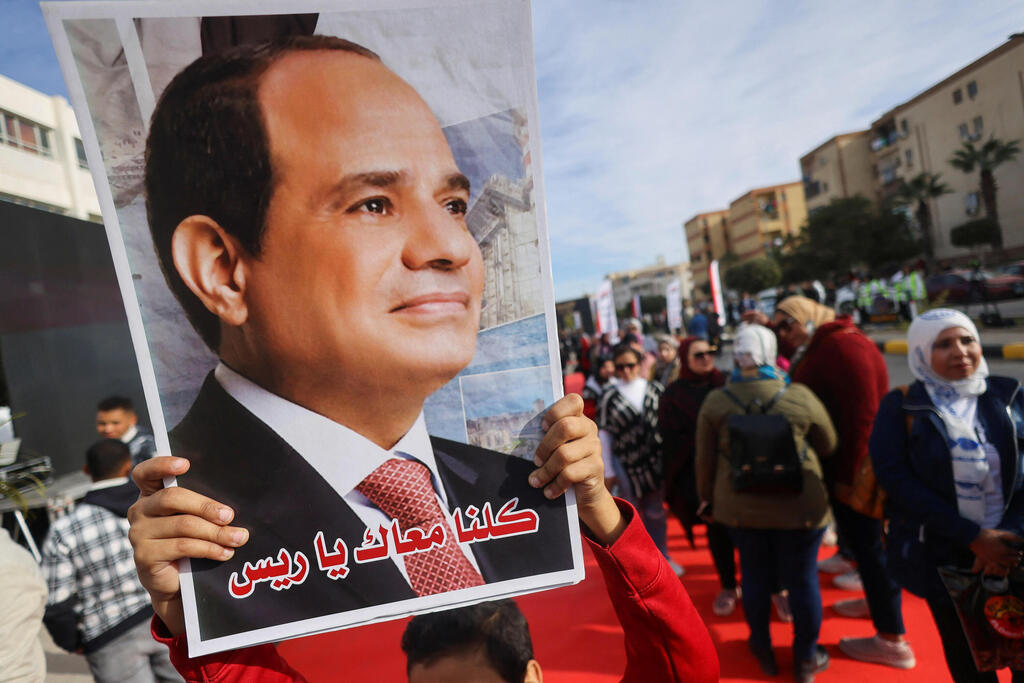Hundreds of distinguished guests filled the massive tent erected in the yellowish desert of northern Sinai, near Rafah. This was to be the site of the new Egyptian city of Ajra, but a last-minute decision changed its name.
Mustafa al-Bakri, a member of the Egyptian parliament who managed the event, made a point of directing attention to Ibrahim al-Arjani, dressed in a pristine galabiya and a traditional Bedouin keffiyeh, as is customary for the tribesmen of Sinai. Al-Bakri referred to him as the "driving spirit" behind the project, deliberately overlooking his financial backing. According to al-Bakri, the first residents of the new city in Sinai would be families of victims of terrorist acts in Sinai: widows and their children, and adult orphans who would move into shared apartments.
1 View gallery


Man holds up election poster of Egyptian President Abdel Fattah al-Sisi
(Photo: REUTERS/Amr Abdallah Dalsh)
The Egyptian story is gaining prominence. Initially, the city will accommodate 900 families, including approximately 3,500 disabled men, widows and orphans—a significant gesture of respect for those who have paid a high price and will soon receive new homes, two schools, a mosque, clinics and a range of grocery, clothing and household goods stores.
This marks the first time a new city is being built in Sinai on a modest budget, near the Gaza border—but not too close. The true hero, after whom "al-Sisi City" is named, was notably absent from the celebratory event. It is likely that, in the days leading up to the city's settlement, a large, tightly secured delegation will accompany the president, surrounded by hundreds of bodyguards.
It is important to remember: the Sinai Peninsula, due to its location between Gaza, Sudan, Ethiopia and Israel, holds immense strategic importance. It is Egypt's eastern border gateway, covering around 15 million acres, which is 6% of Egypt's total area.
President Abdel Fattah al-Sisi has expedited a special project aimed at connecting the two banks of the Suez Canal, but primarily to eradicate terrorist organizations in Sinai in cooperation with the IDF and Bedouin tribal leaders. Following this, the idea to establish "Al-Sisi City" emerged, with Egypt reiterating that there would be no opportunity for Gaza residents to move to Sinai; the new city is intended solely for Egyptian citizens. Gaza is for its residents, al-Sisi declares, who will remain in the Palestinian territory.
Persistent rumors suggest that the "Al-Arjani Gang" is frequently sent to intimidate and mediate in the dispute over the diversion of the Sudanese and Ethiopian Nile waters, Egypt's lifeline.
Along the sands of Sinai, giant signs announce the establishment of the Rais’s city, featuring large portraits of him. The financier, who took on the responsibility of funding the project, bringing in construction workers, engineers and road builders, is Ibrahim al-Arjani, the wealthy magnate of the Sinai Peninsula. His company, El-Arish, had recently charged between $5,000 to $10,000 per adult and $2,500 per child for passage from Gaza to Egypt.
Al-Arjani, who holds numerous economic titles, was honored with the title "Leader of the Arab Tribes" in Sinai and sat beaming with pride at the city’s inauguration ceremony. He has known the Egyptian president for ten years, dating back to when al-Sisi served as defense minister under Mohamed Morsi. Both have vowed, from their respective positions, to eradicate terrorist organizations in Sinai. Al-Arjani has expanded his empire by establishing construction, tourism and transportation companies and taking control of the Egyptian border terminal at Rafah.
Persistent rumors suggest that the "Al-Arjani Gang" is frequently sent to intimidate and mediate in the dispute over the diversion of the Sudanese and Ethiopian Nile waters, Egypt's lifeline. Al-Arjani's Egypt-Sinai Company has introduced a new element to the trade map: partnerships between the Bedouins of Sinai and the Gulf Arab emirates, with the grand ambition of including Saudi Arabia in this trade network.
The Egyptian military will remotely oversee the construction of the new city and block passage routes for Palestinians from the Gaza Strip. The cornerstone has already been laid, and Israel is watching closely. It will be interesting to see who the city's residents will be, whether they will be allowed to carry weapons, and against whom they might act. After all, the honorary president of this ambitious project is none other than the man for whom the city is named.

